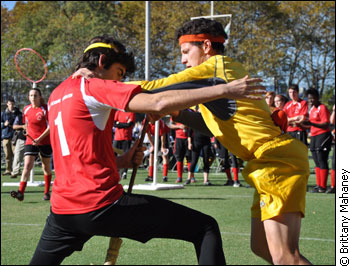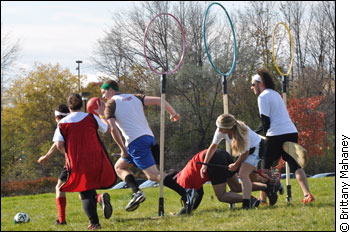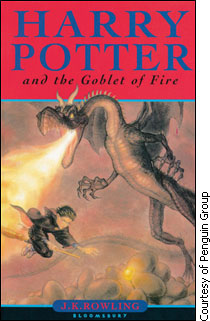Tags
Related Posts
Share This
Quidditch for muggles
The seeker darts across the field on his broomstick when he spots the golden snitch—a university-team wrestler, dressed in gold—taunting him from the audience. The snitch is wedged among 20-something-year-old Harry Potter devotees torn between watching the coming confrontation and protecting their homemade magic wands

A seeker (left) braves a stalwart defence, trying to capture the flag attached to the golden snitch’s shorts.
“The snitch has been spotted!” the narrator yells, attempting a British accent.
Attention turns to Carleton University’s chaser, who is racing down the field with a quaffle (a volleyball to ordinary Muggles) under her arm. This isn’t an easy task, as she must sidestep the flying bludgers (dodgeballs) that the beaters are throwing at her. “Beat her! Bludge her!” chants a crowd of impassioned Ohio State fans in the audience. If it weren’t for the incessant cheering, it would be difficult to tell where each person’s allegiance lies, as both Carleton and Ohio sport red jerseys.
Amid this chaos, Carleton’s seeker focuses on his golden target and tackles the snitch to the ground, grabbing the flag around his waist. The Quidditch game is over and Carleton is victorious in its second game at the fourth annual World Cup in New York City’s DeWitt Clinton Park.
On a sunny day that seemed too hot to be November, with a backdrop of towering Manhattan buildings, Carleton took the field against 45 other teams at the World Cup. The Nov. 13–14 event, which is organized by the overarching International Quidditch Association, drew over 20,000 spectators and 757 players this year.
You needn’t believe in magic to see that Quidditch is now being taken seriously as a university sport. Carleton is one of 400 universities across the world to create a Quidditch team since 2006, inspired by J.K. Rowling’s Harry Potter series and the unforgettable scenes from the movies. The sport is a combination of football, dodgeball and tag, and is surprisingly demanding.
For the love of Harry
Andrea Hill, 20, captain of Carleton’s team, says children who grew up with Harry—literally, being about Harry’s own age as the books were released—are now adults and don’t want to let go of their favourite hero. Many of the players are of this age, about 20 or 21. And Harry is easy to identify with: At core, he faces struggles that are universal.
“He may be able to fly on a broomstick and transfigure matchsticks to needles, but he is self-conscious, struggles with schoolwork and has a short temper that more often than not lands him in detention,” Hill says. “The books have taken a very fantastical element and grounded it in something normal people can relate to.”
Tabitha McDonald, 20, a keeper for Carleton University who recently wrote an English essay about the heroism of Severus Snape, starts giggling with the other girls at the mention of Daniel Radcliffe. She holds an icepack on her injured leg and mentions she is also nursing a broken rib. For McDonald, playing Quidditch is worth the pain. While she describes the team as a bunch of like-minded nerds, Quidditch also serves a deeper purpose: a way for her to connect with her favourite childhood series. It prompts memories of reading with her parents and the impatient wait each year for the next book to hit shelves.
“My whole year was centered around reading the next book,” McDonald says. “Quidditch was this sport that I had dreamed was a possibility, and then I heard about it and it was probably one of the happiest days of my life.”
At the World Cup, one could easily note that some players draped velvet Gryffindor cloaks over their shoulders or could recite Hogwarts-type incantations on command. Beyond obvious incentives to exercise and socialize, Harry Potter seems to have struck a deeper nerve with these Quidditch players, touching of their self image. In fact, the cultish loyalty of players leads naysayers to deem Quidditch obsessive.
Why has Harry Potter remained so popular with young adults? “It crosses a lot of gaps and speaks to everyone,” McDonald explains.
‘Quidditch was this sport I dreamed was a possibility. Then I heard about it and it was probably one of the happiest days of my life.’
– Tabitha McDonald
Sherry Aske, a keeper for Carleton, remembers reading Harry Potter as a child and dreaming of running away to Hogwarts when she was upset. Aske, now 20, she says her love for the series will never waver.
“Reading works the same way for me now when I get stressed. I always liked it because you can escape from the everyday world. It’s like therapy,” she says. “I think it doesn’t matter how old you get but you don’t—I hope, anyway—you don’t lose your imagination.”
Paramedics were on hand at the World Cup, wheeling several overzealous players off the field on stretchers. Commentators occasionally narrated in Parselmouth (the language supposedly spoken by snakes), and there was that brunette dressed in navy blue who kept introducing herself as the head of Ravenclaw House.
The dark side
Whether this sense of whimsy is light-hearted or serious is arguable. Turning fantasy into reality might do long-term damage to our collective imagination, says Susan-Anne Cooper, a professor of children’s literature at Carleton.
“People are quite happy to have it be literal, at which stage it’s not fantastic: There’s no room for make-believe or imagination,” Cooper says. “If people become completely literal-minded and lose the capacity to imagine, then we’re in big trouble.”
In this vein, Cooper points out, anyone can see Hogwarts Castle, visit Ollivander’s wand shop or sip butterbeer at Universal Studios’ new Harry Potter theme park in Florida. At least Quidditch players have to pretend they are flying (until hoover-boards become mainstream).

A magic moment: Carleton throws the quaffle through the hoop, in a home-field game.
But Irvin Khaytman believes the sport shouldn’t be taken so seriously. Khaytman is a member of New York’s community team—the only team not tied to a university or high school. For him, Quidditch isn’t just a fantasy realized, it’s also a way to connect with likeminded people and to exercise.
“I’ve never been athletic, so to join a team full of nerds who just run around on brooms in capes and act goofy, it seems like an amazing time.”
Khaytman says he’s nostalgic for the series because he grew up with Harry and was the same age as his favorite characters when he read each book.
“It’s your past,” he says. “Everyone’s been at school; they’ve had the school bully; they’ve had the school teachers that you love and hate; they’ve had the evil assistant principal.”
Now, in the swirl of work and stress, Khaytman says playing Quidditch brings him back to a safe space.
Back in Ottawa, Carleton is competing against Saint Lawrence University on home ground. Nine-year-old Maliha Sarwar sits in the crowd with her mother and brother, munching on a licorice wand she bought in support of the team. Currently, the family is reading Harry Potter together and watching the movies after each book. Maliha represents a new generation that is growing up with Harry and his friends: she even dressed as Hermione last Halloween. Now, at the game, she watches team captain Hill, whose face is swathed in red war paint, tackle a male player two feet taller than she.
“I think it’s a very good game; I like Quidditch,” Maliha says. She repositions her glasses and waves her candy wand as she says, “I think I’d like to play one day.”
Related Links
Audio Visual Slideshow: Why Quidditch players love Harry Potter
A Quidditch glossary
Beater — defensive player who throws bludgers (dodgeballs) at the opposing team. When hit, a player must run a lap to his/her team’s goalpost.
Chaser — offensive player who throws quaffles (volleyballs) into the other team's hoops to score 10 points.
Keeper — must prevent the other team from scoring, much like a goalie.
Seeker — must capture the flag, which is attached to a human snitch. When the flag is caught the game ends and the victorious seeker scores 30 points for his team.
Snitch — usually a wrestler and/or cross-country runner who aggravates, taunts and runs away from the seekers. Snitches are notorious for climbing fences, hiding in the audience and stealing possessions that belong to the seeker.
Quidditch — the wizarding sport that Harry Potter and his friends play at Hogwarts. Two teams of seven compete against each other on magic broomsticks.






